If the debate about how the U.S. and the international community should respond to the carnage in Libya highlights one thing, it is that we still have not arrived at either a domestic or global consensus about when and why to intervene militarily in the affairs of a sovereign state. I include Iraq in the title of this post for three reasons. First, the pre-emptive nature of the Iraq invasion in many ways served to sidetrack the debate over humanitarian interventions. Second, the outcome of the Iraq War served to chasten the broad middle of the policy debate, if not […]
Human Rights Archive
Free Newsletter
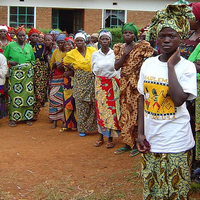
As more sickening details emerge of what actually happened to CBS reporter Lara Logan in Tahrir Square on Feb. 13, the partisan rhetoric shows no signs of abating. Some claim that it was “pro-Mubarak” thugs who sexually assaulted and almost killed the 39-year-old mother of two, while others point the finger at “pro-liberation” hooligans. Still others have used the incident to demonize Muslims in general. Such distinctions, however, have nothing to do with why Logan was attacked and, in fact, obscure the real issue. Like many millions of women, girls and young boys around the world, Logan was not a […]
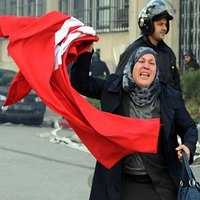
Much analysis of the wave of unrest sweeping the Middle East has identified economic hardship as a crucial motivation for the uprisings. Many Middle East experts pointed to unemployment and the rising price of food in Tunisia to explain that country’s uprising. The same experts pointed to unemployment and mass poverty to explain the subsequent Egyptian uprising. But after Egyptians successfully ousted Hosni Mubarak, unrest subsequently spread to Libya, Algeria, Iran, Bahrain, Yemen and Jordan, countries with very diverse economic conditions. Standards of living in Bahrain and Libya, for example, are much higher than in Egypt and Yemen. Furthermore, the […]
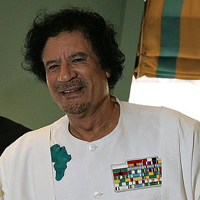
For players of the decades-old parlor game of divining succession in despotic Arab regimes, one rule never varied: The current dictator would personally choose his successor, almost always selecting one of his sons to head the regime after his death. Until this week, that dynastic pattern seemed certain to apply to Libya’s Col. Moammar Gadhafi, whose sons have spent years seeking their flamboyant father’s favor and jockeying for position within that most peculiar of regimes. The eccentric, histrionic and often-buffoonish Gadhafi has provided four decades of outrage, disbelief and even entertainment for outside observers. For those living under his rule, […]
Security forces have clashed with anti-government protesters in Yemen on the seventh consecutive day of demonstrations calling for the ouster of the president. Police have shot and killed two protesters in the Yemeni city of Aden as unrest in the capital Sanaa against President Ali Abdullah Saleh flared for a fourth straight day.
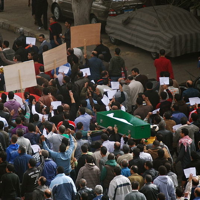
What kind of country do Egyptians want to build? That is one of the most important questions arising from the country’s recent revolution, one with enormous geopolitical consequences and whose answer remains clouded in speculation, mystery and contradiction. Egyptians toppled their government in part because it cared little about their views and priorities. Until now, the public had negligible influence in the country’s policymaking process. That has changed suddenly and dramatically. Without a history of open political discourse and competitive elections, however, it is unclear what path Egyptians will choose in the coming months when, presumably, democracy will turn public […]
There have been angry scenes in the Iranian Parliament as members took to the floor to condemn anti-government protests at the weekend. State television showed parliamentarians calling for the opposition leaders Mir Hossein Mossavi and Mahdi Karroubi to face trial. Both have been under house arrest for a week after asking for permission to protest.
The transformation currently unfolding in the Middle East could be as monumental as the changes in Europe that followed World War II and the disintegration of the Soviet Union. In both of those instances, the goals of the United States and its allies were transparent and consequential: to solidify Western power and establish a world order based on democracy and market economics. This successful model should be pursued once more by providing smart, dual-benefit assistance to all Middle Eastern nations seeking to build free and democratic societies. In the coming months, numerous governments in the Middle East will likely need […]
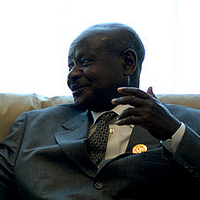
KAMPALA, Uganda — When Ugandan President Yoweri Museveni seized power 25 years ago, he brought order to a nation that was reeling from two decades of crisis. After the terror-filled reigns of Idi Amin and Milton Obote, Museveni ushered in an era of relative prosperity. The West was quick to brand Uganda a rare “African success.” Praised for tackling HIV/AIDS, promoting women’s rights and pursuing growth through the Washington Consensus of fiscal discipline and free markets, Museveni gained acclaim as a “New African Leader”: a bush soldier turned democrat, poised to steer his continent in a new direction. But in […]
Burma’s opposition leader, Aung San Suu Kyi, is calling for Western countries to end sanctions against the country’s military regime. She says the sanctions have hurt ordinary Burmese, as about a third of the country’s 50 million people live below the poverty line. Burma’s National League for Democracy’s party says it wants to talk with Western nations about cutting back sanctions against the military ruled state.
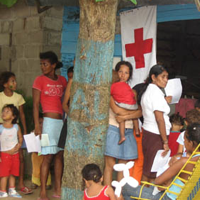
Looking down from the hilltops of Bogotá’s southern rim, a sea of shingled rooftops and cinderblock huts stretches toward the horizon. These ever-expanding slums are home to tens of thousands of internally displaced persons (IDPs), Colombians who have fled their homes elsewhere in the country to escape the country’s long-running armed conflict. Here, Lady Carabali, a mother of five, lives in a damp, ramshackle home made from pieces of wood and scrap metal, with no running water or electricity. She was driven from her small farm on the Pacific coast by paramilitary violence more than a decade ago. Each day, […]
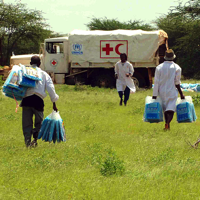
One need not venture far into the world of refugee assistance to encounter a maxim whose air of axiomatic truth can be a conversation-stopper, and whose terms, like sacred postulates of the refugee-response system, are rarely unpacked: The Office of the U.N. High Commissioner for Refugees (UNHCR) has the refugee-protection mandate. But several issues within that black box are worth illuminating. Namely, what does “refugee protection” mean? What is the nature of the “mandate”? And is it true that UNHCR is its unique possessor? While this might seem like a dry line of inquiry, like so much else these days, […]
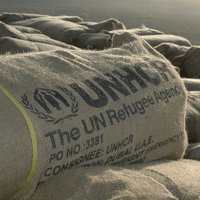
One of the most complex and difficult humanitarian problems confronting the international community today is that of protracted refugee situations. These are refugee situations that have moved beyond the emergency phase, but where solutions in the foreseeable future do not exist. Many of the refugees left behind in these situations have to live under terrible conditions, warehoused in camps or stuck in shanty towns, exposed to dangers, and with restrictions placed upon their rights and freedoms. I first became aware of the significance and dimensions of the contemporary problem of prolonged exile in 2001, after a brief visit to the […]

Not since the 1960s has the idea of a common Arab identity seemed more real. The Tunisian and Egyptian revolts were quickly defined as Arab uprisings; sure enough, these historic events have already reverberated in Yemen, Jordan, Syria, and even Saudi Arabia. But Tunisia and Egypt can also be described as African countries, and not just because of their geographic location. The nations of North Africa have been imagined as African by some of the region’s political and intellectual luminaries. Even Gamal Abdel Nasser, Egypt’s leader from 1956 to 1970 and an eloquent paladin of pan-Arabism, invoked the African element […]
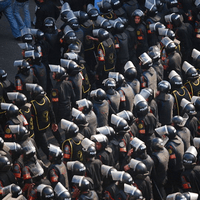
The uprising in Egypt has framed a dilemma in the starkest of terms: Does the West want true democracy in the Middle East, even if it brings the possibility of some rather frightening scenarios? A democratic Egypt could blossom into an open, pluralistic society, with equality for all religions and between men and women, continuing good relations with the West and enduring peace with Israel. But it could also follow a path similar to Iran’s after the overthrow of the shah, with the popular movement hijacked by a well-organized militant religious movement, leading to decades of oppression and strife — […]
